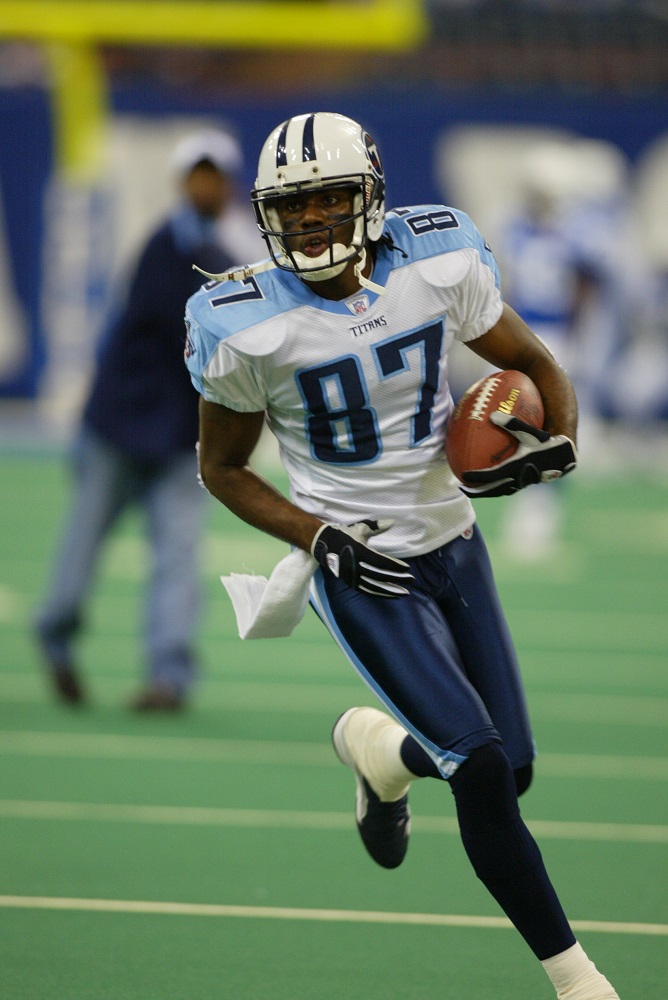Photo Cred: Tennessee Titans
By Jim Gehman, Player Engagement Insider
Arguably, the two most renowned plays in Tennessee Titans history happened only 22 days apart. And wide receiver Kevin Dyson was a vital key in both.
On January 8, 2000, in what became known as the “Music City Miracle,” Tennessee produced a come-from-behind victory over the Buffalo Bills in the AFC Wild Card playoff game when, with 16 second left in regulation and trailing by one, during a kickoff return, tight end Frank Wycheck lateraled the ball across the field to Dyson, who ran with it 75 yards for a touchdown.
On January 30th, trailing the then-St. Louis Rams by seven points in the final seconds of Super Bowl XXXIV, the Titans had the ball on the St. Louis 10-yard line, and one down to try and score the game-tying touchdown. Tennessee’s quarterback Steve McNair completed a slant route to Dyson, but he was tackled one yard short of the goal line by Rams linebacker Mike Jones.
“I think they’re both unique in their own perspective,” Dyson said. “One, being the ‘Music City Miracle,’ it was a play that helped give us another opportunity the following week to play again. And later with the Super Bowl, it was the culmination of a long season. The game, there’s a surrealness that surrounds it, the yellow and blue confetti falling down, and you’re sitting there in disbelief that it’s over.
“I just was fortunate enough to play (in the NFL). I got the opportunity to do something that very few get the opportunity to do. Obviously, two of my most memorable moments come from that (1999 season), but I don’t have one thing that is the thing I’m most proud of.

“I will say this, the NFL’s not made up of Hall of Famers although we all would like to be. I would have loved to have caught 200 balls a year and had a Hall of Fame career, but that just wasn’t in the cards for me. To have something that I could still be somewhat relevant even nearly 20 years later is something special that I don’t take for granted.”
Dyson, a Utah native, who was chosen in the first round of the 1998 NFL Draft out of Utah by the then-Houston Oilers, would spend five seasons with Tennessee before concluding his career by playing in one game with the Carolina Panthers in 2003.
“We all go in with high aspirations, especially if you’re a first-round draft pick,” Dyson said. “I came to a situation where we were a run-first offense, and besides that, I had some injuries, especially early in my career. So, I had to do what I had to do and make the most of what I had.
“I always figured football had to end at some point. I don’t know if I really thought about specifically what I wanted to do (after football) until I actually was forced to. Even then it took me some years to settle in to what I’m doing now.”
After spending time at different schools as an athletic director and football coach, Dyson is now in his third year as an assistant principal at Independence High School in Thompson’s Station, Tennessee.
“I wanted to give back, help kids and, more specifically, I wanted to coach the sport that had been good to me. I always loved managing and leading and I did the (NFL) minority coaching (internship) with the Titans. I wanted to coach, but that’s a whole different life. You’re gone on the weekends, you don’t get vacation days off, you don’t get holidays off, you’re still working. So, ultimately, after a few years, I just settled into secondary education and hopefully, I’m doing OK. I enjoy it,” said Dyson, who is also a pregame/postgame analyst for the Titans Radio Network.
“I’m the administrator over the freshman class. Of course, you’ve got your typical stuff like discipline, class schedules and things of that nature. And then there are other responsibilities that come along with that. But I am principal of the ninth grade and I am the principal over the English, social studies and fine arts.
“(I enjoy) the interaction with the kids and I’ve grown as a leader. One thing about being a leader on a football team, you can be vocal, but a lot of it can be the same stuff. You’re trying to motivate teammates and things like that. But on this side of it, the education side, it’s more trying to figure out how to help others grow. Whether it be teachers or students. That forces you to try to grow as well because you have to become a leader in different respects.”